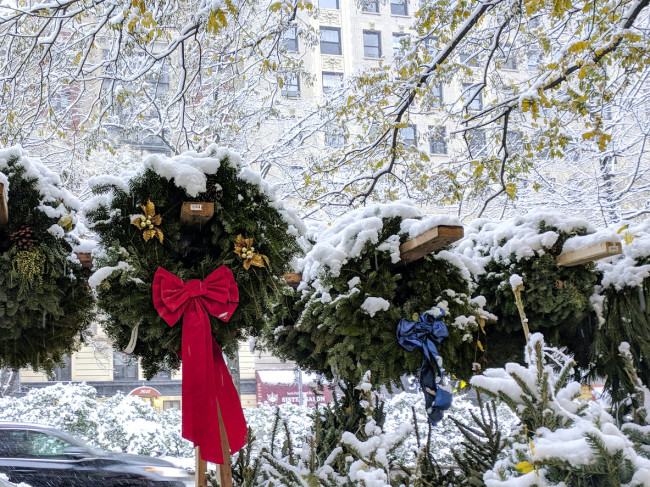Why do we tip, anyway? A history of paying gratuities

The idea and practice of tipping can create a lot of anxiety, whether you're an overseas visitor—one Australian travel guide, for instance, notes that the ritual can induce panic, and sometimes, resentment, in foreign tourists, and provides an exhaustive guide to all the situations in which they might be expected to tip stateside—or just a local who can't make out how much to tip, or if you're expected to do so.
The prospect of doling out holiday tips is even more amplified among New Yorkers used to vertical living in buildings staffed from top to bottom. (For help with this, check out our guide to how much to give your doorman, concierge, super, porter, and more.) Given that this holiday tradition can end up costing hundreds—and sometimes thousands—of dollars, it makes sense to want to know how this whole tradition came about in the first place.
According to Conde Nast Traveler, many nations have a tipping culture, though the standard gratuity outside the United States is often lower than what Americans are accustomed to giving. And in some countries, like South Korea and Japan, leaving a tip is actually considered something of an insult. In the United Kingdom, meanwhile, gratuity is frequently included in bills, helping to eliminate the anxiety of calculating what is appropriate.
Born across the pond
Interestingly, though, the U.K. is where tipping is believed to have originated. Business Insider writes that in 17th-century England, coffeehouses began leaving out bowls to collect gratuities from the upper classes. Some believe the word tip is an acronym, standing for "To Insure Promptitude," though Snopes demurs, claiming the word's etymology is unknown, but did originate with the British aristocracy giving a few extra coins to servants.
In the 19th century, the European upper classes brought the custom to America with them, though from the start, tipping was met with criticism. Business Insider notes that an Anti-Tipping Society was formed in Georgia in 1904 on the grounds that the practice was undemocratic. NPR explains that many Americans of the 1800s disdained the way tipping encouraged bowing and scraping before the upper classes, and even such captains of industry as John D. Rockefeller and Andrew Carnegie agreed. (Though perhaps they were just being cheap.)
Some states went so far as to officially outlaw tipping, but by 1926, the laws were overturned, as the practice was already too entrenched to effectively ban. Although tipping ultimately prevailed, there are still some resisters today. In 2015, for instance, NYC restaurateur Danny Meyer eliminated tipping at his eateries, instead raising menu prices (as well as wages for staff).
The case for, and against, tipping
The critiques of tipping are well-founded, it seems: The practice is just as mired in troubling class dynamics as it was in the England of the 1600s. Mother Jones explains how tipping allows restaurant owners in many states to pay wait staff well below the minimum wage; it seems that gratuities don't make up for the loss, as food service workers are among the most poorly paid in the country.
Furthermore, people of color are disproportionately harmed by the practice, the article continues, as they are regularly tipped more poorly than their white counterparts. Many advocates for tipped workers suggest mandating that they receive the minimum wage, as well as folding gratuitities into the bill, as Danny Meyer has done.
For building staff, however, it's a bit different, as many are salaried employees. In 2014, the doormen union negotiated for a salary increase to $49,402 a year, writes Crain's; according to Habitat, a New York City superintendent might earn anywhere between $40,000 to $90,000 per year. Per Indeed, porters and garage attendants expect to make around $38,000 and $30,000, respectively.
Unlike restaurant staff, then, these employees don't depend entirely on the goodwill of customers to earn a living—though consider how far the aforementioned wages can take you in ultra-expensive NYC. Plus, when Brick polled New York City doormen last year, some said they do count on tips to see them through the holiday season, with the extra cash often going toward gifts for family members.
So while you may rightfully find the overall practice of tipping problematic, remember that it's a show of appreciation for the people who keep you safe through the year.
You Might Also Like




























